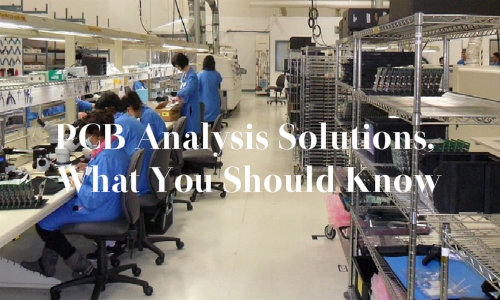If you are shopping around for a printed circuit board fabricator it is a good idea to do your research so you can equip yourself with the proper information. Understanding the different types of PCB, their functions and capabilities will help you communicate better with your manufacturer. You also will want to gain an understanding or brush up on the different testing services they offer to ensure that the PCB will work properly before you receive the final product. Below is a list of considerations that you should be aware of.
- The major types of PCB’s
- Root cause analysis
- Common failure analysis tests
- Common PCB challenges
Types of PCB’s and Testing Processes
There are three types of printed circuit boards.
- Single-sided: Used for simple electronic devices
- Double-sided: The most popular type, used in most computerized machines
- Multilayer: Used in computers as well as high technology
The testing process for your printed circuit board regardless of the type you have chosen to have fabricated. You should make sure that your manufacturer has testing in place.
- Increased density
- High lead-free temperature requirements
- Hazardous material
- Recycling requirements
- Tune PCBs to precise values
- Other changes in the fabrication
Root Cause Analysis
During the fabrication process there are numerous machines or tools that will be utilized, they should include;
- Screen Printers
- Conveyors
- Pick-and place systems
- Reflow ovens
- Automated optical inspection
- Solder paste
- Other various components
If the PCB does not operate correctly, then testing it becomes a must so the manufacturer can pinpoint the cause and make the appropriate corrections to get it functioning properly.
Failure Analysis Tests
Below you will find a list of common tests that you should ask your prospective fabricator about. Specifically, if they perform them.
- Micro-sectioning Testing
- Solderability Testing
- Contamination Testing
- Optical Microscopy/SEM
- X-Ray Inspection
While you are interviewing the prospective manufacturer ask them if they offer any or all of these tests.
Common Challenges
There are many challenges that your fabricator must face when they are creating you PCB. The nature of the process is delicate and with the trend of technology coming up with smaller and smaller devices the work becomes even more delicate and complicated.
- High-speed Printed Circuit Boards
- Lead-free Assembly Process
- Plated Through Hole Barrel Cracking
- Correct Surface Finish Selection
- Conductive Anodic Filament
Communication/Customer Service
Now that you have an idea of what you should be looking for regarding the testing processes offered, we can move on to customer service and communication. It is extremely important that you speak with your fabricator, understand their procedures, and ask questions about anything you may not understand. This brings us to the customer service, when you are asking your questions the answers you receive should satisfy you. They should also return any messages you leave for them in a timely manner. Developing a good working relationship with your manufacturer will put you at ease and keep you informed of the progress or if there are any issues that must be dealt with.






